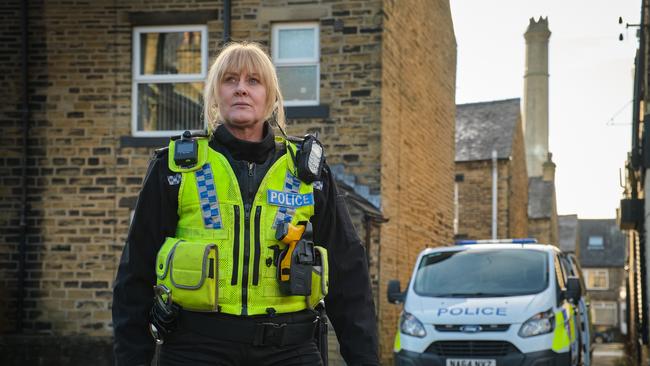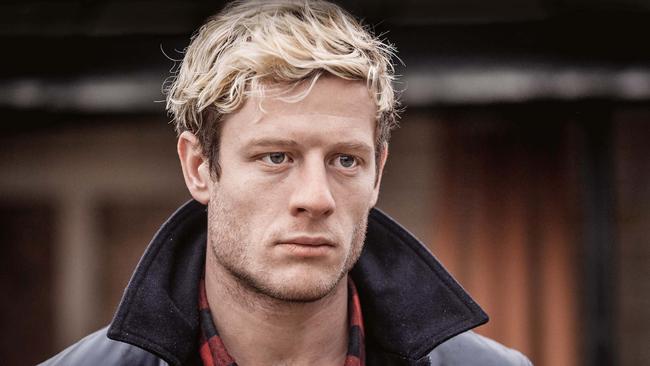Happy Valley season 3: Redemption in the name of peace
The third season of Sally Wainwright’s riveting drama Happy Valley promises to be as gripping and rewarding as the previous two.

“When people talk about my work, and talk about me writing for women, or strong female characters – it’s made me realise how badly women have been served in the past,” TV writer Sally Wainwright told journalist Zoe Williams a couple of years ago, describing female characters as little bits put together to resemble a woman. “And it is quite striking, when you look into the history of telly, that predominantly women have been written by men, and represented through the prism of men’s eyes.”
Well, Wainwright was never taking that, having she says, simply invented characters she wanted to watch and read about, “unaware that I was doing a feminist thing”.
Wainwright is the brilliant British writer who after the successful At Home with the Braithwaites in 2000, really came to fame with the 2011 cop show Scott & Bailey. It was a subtly realised police series featuring all-female leads, and Wainwright found the right balance between realistic English police procedures, some rather nasty displays of aberrant criminality, and police workplace politics with realistic human interest stories with a faint feminist edge.
Then came Last Tango in Halifax in 2012. It picked up a swag of awards and proved to be a nice change, too – this time from the cliched depiction of the over-60s in most TV dramas who are usually figures of fun or targets for condescending sentimentality.
A couple of years later in 2019 she returned to Halifax in Yorkshire for her new series Gentleman Jack. Set in 1832, it is part robust period drama and part love story, though it’s also a kind of witty feminist discourse on historical figure Anne Lister, played brilliantly by Suranne Jones.
In 2014 she also wrote Happy Valley for the BBC, the story of a police officer with a tragic past, who once she finally gets her life back together is tormented by the man responsible for her daughter’s death eight years earlier.
It’s arguably her most talked about show and certainly one of TV’s finest cop dramas. In its delayed third season it is finally coming to a dark conclusion.
Happy Valley stars the now iconic Sally Lancashire, who was brilliant recently in Julia, the HBO series based on the American cook Julia Child, in that she was able to evoke memories without falling into parody with her layered, immaculate but fully lived-in performance.
She brings the same sort of balance as Sergeant Catherine Cawood, a tough-minded cop for whom a case is not merely a problem; it can become a crusade to root out and destroy the evils that have corrupted the urban world of West Yorkshire’s drug-ravaged, poverty-ridden Calder Valley.
The title is an ironic reference to the way real Yorkshire police refer to their precinct featuring majestic countryside surrounding towns in the long shadow of industrial decline, where addiction is a complex public health challenge. The irony is undercut by the propulsive, thumpingly raw theme song Trouble Town from Jake Bugg: “Stuck in speed bump city/Where the only thing that’s pretty/Is the thought of getting out.”
For Catherine, toughness, cynicism and an offbeat humour form a protective colouration protecting the essence of her character, which is honourable and noble, despite her many flaws. You can see it when she slides into uniform at the station, her acceptance of the fetishes of power: the belts, epaulets, Taser, radio, the bright yellow vest. Before entering any skirmish, either physical or emotional, she sets her cherished cap just so on her head.
(“Miss Trunchbull” she’s nicknamed by her station co-workers, not always affectionately.)
The women she works with – there aren’t many, apart from long-suffering colleague Joyce (Ishia Bennison) – are gritty. We sense an empathy with criminals their male colleagues don’t share, an understanding of fragile humanity. And that they, at least, might appreciate the socio-psychological motivations that underpin crime.
Like real police, the show’s detectives struggle to solve crimes. The men, her superiors largely, are sympathetically dishevelled and fallible, with limited intuition. The women rely on grimly realistic humour to balance the depressing realities of the job. The investigations led by the senior male detectives seem haphazard, poorly co-ordinated and lazy.
One of the delights of Lancashire’s performance is the way that, while she shows that Catherine has the conviction that rules are to be enforced and the commitment to duty to see that they are, occasionally a Dirty Harry moment will sometimes emerge – something repressed that she is only just able to manage. These are moments of great conviction and dramatic impact.
But as Wainwright says, Happy Valley is not really a police show, “It’s a show about Catherine, who happens to be a police officer. It’s not a police procedural, it’s not a crime show. It’s really about Catherine and about what happened to her in the past and this weird crooked relationship she has with this man who affected her life so badly.”
He’s Tommy Lee Royce, played brilliantly by James Norton, who torments her though the show’s three seasons. He is father to her grandson, Ryan (Rhys Connah), who as the series unfolds is determined to have a relationship with him.

Catherine’s teen daughter Becky took her own life after being raped by Royce, and with her sister, recovering heroin addict Clare (Siobhan Finneran), she brought up Ryan. It’s been no easy undertaking; Ryan is rebellious, truculent and prone to violent turns about the house Catherine shares with Clare. In the first series, eight years after Becky’s death, when Catherine learns of Royce’s release from prison, she hunts him down, not realising he’s helped kidnap Ann Gallagher (Charlie Murphy), whom she rescues despite a terrible beating from Royce. He ends up back in jail with multiple life sentences.
Then in season two, obsessed with his son, Royce grooms a prison groupie to exact revenge on Catherine through developing a relationship with Ryan. His grandmother is now fearful that the boy has maybe inherited some of Royce’s sociopathic behaviours. It’s a very creepy episode.
It’s six years later when the final season begins and we catch Catherine in the first episode, due to retire in “seven months, one week and three days”. She’s on routine patrol in that familiar blue and yellow cop car, dispatched to a muddy drained reservoir. There she recognises a skeleton as the dumped remains of Gary Gogowski, who was executed by gangland associates and buried in concrete eight years ago.
Evidence quickly leads back to the jailed Tommy, now looking like long-haired Charles Manson, a picture of Ryan, who is about to turn 16, in his cell. Quickly implicated are Darius Knezevic and his brother who violently ran drugs and people smuggling operations when Gogowski was around. As Catherine says, “New Jersey has the Sopranos. Halifax has the Knezevics.”
Ryan is having problems at school with bullying PE teacher Rob Hepworth (Mark Stanley), a control freak who’s also humiliating and intimidating his wife Jo (Mollie Winnard), who’s suffering from diazepam addiction. Catherine becomes involved, though can only set institutional events in motion at what’s an early stage of intervention.
Events quickly lead to Jo’s supplier, self-effacing pharmacist Faisal Bhatti (Amit Shah), with whom she’s been exchanging sexual favours for drugs. Wainwright’s self-assured plotting – always full of serendipitous surprises – soon has Faisal being blackmailed by local drug lords, warning him, “We run these postcodes”.
It’s a complex first episode but there’s little doubt – even as events pile up – some kind of final confrontation is looming for Catherine and her nemesis Royce.
Wainwright’s plotting never seems mechanical; it’s always clever and unexpected enough to sustain her parallel stories and to create wattage out of narrative.
Even when the series focuses on the domestic scenes Catherine shares with her sister, the dialogue moves with a snap; the extraneous is elided and witty and not a word is wasted.
She possesses a rare skill in her ability to create tension from scenes, an underlying sense of dread, while her characters always remain believable and authentic.
Wainwright says this sense of accuracy is due to what she calls “proper research”. Two cops, retired police constable Lisa Ferrand and retired detective superintendent Janet Hudson, are part of her process from the beginning of each script. “I don’t write the script and then invite them to have a look and see if I’ve done anything wrong.”
There were several influences on the creation of Catherine Cawood. “I saw a documentary by Jez Lewis called Shed Your Tears and Walk Away and it was about drug and alcohol problems, specifically in Hebden Bridge (where much of Happy Valley was filmed),” Wainwright says. Then there was the 1980 police drama series Juliet Bravo, filmed not far from Hebden Bridge and created by the prolific Ian Kennedy Martin, who was also responsible for The Sweeny.
It revolved around a newly promoted female police Inspector called Jean Darblay, whose radio call sign was “Juliet Bravo”, a career copper constantly coping with sexism and misogyny. “It’s kind of in my top 10 TV shows from adolescence,” says Wainwright.
There was also Nurse Jackie, the US sardonic comedy about a ministering angel with the devil’s own addiction to painkillers, navigating the sometimes frenzied traffic in the emergency room of a fictional Catholic hospital in New York’s Lower Manhattan.
Like Nurse Jackie, for all her failings and weaknesses, Catherine too is always humane in the midst of moral chaos. And if she works in a little redemptive vengeance, maybe she’s just doing her part to make the world a better place.
Happy Valley (all seasons) streaming on Binge.




To join the conversation, please log in. Don't have an account? Register
Join the conversation, you are commenting as Logout